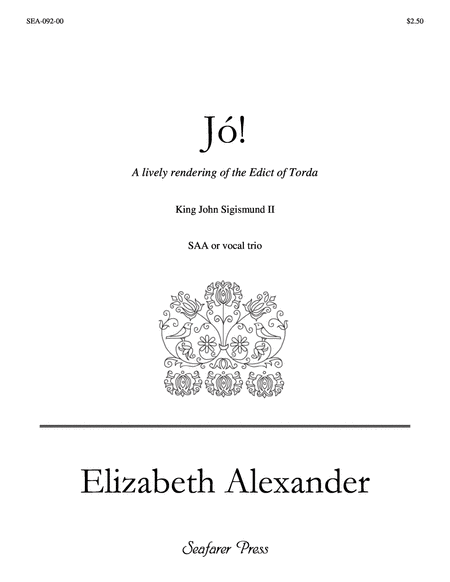Jo!
$2.50
Order On Demand
-
Ships in 4 to 6 weeks
See more offers for this item
Details
Instruments
Ensembles
Composers
Publishers
Formats
Item Types
Levels
Usages
Description
Women's Chorus (SSA choir (woman's choir) a cappella) - Moderate
Text: A predikatorok minden helyen hirdessek az evangeliumot, kiki az o ertelme szerint, es a kozseg, ha venni akarja, jo, ha nem, senki ra ne kenyszeritse, az o lelke azon meg nem nyugodvan, de tarthasson olyan predikatort, akinek tanitasa oneki tetszik. Es ezert senki...a predikatorokat meg ne banthassak, a religioert senki ne szidalmaztassek... Mert a hit Istennek ajandeka, az hallasbol leszen, mely hallas Isten igeje altal vagyon.
SKU: SF.SEA-092-00
Composed by Elizabeth Alexander. Community Chorus, Concert Music. Freedom of Thought, Freedom of Religion, Sacred, Choral. Octavo. With Text language: Hungarian. Duration 2 minutes. Published by Seafarer Press (SF.SEA-092-00).Text by King John Sigismund II of Hungary, excerpt from "The Edict of Torda".
In 1568, during a period of intense religious violence in Europe, King John Sigismund III of Hungary issued a decree granting unprecedented religious freedom to his country's people. Imagine a group of women spreading the news to everyone in their village, quoting from this historic decree, the Edict of Torda. Sung in Hungarian and crafted in the style of Eastern European folk music, "Jo!" - meaning "it's all good!" - carries a joyful message of tolerance that is still as relevant as ever.
Composer's Note: I conceived "Jo!" as an imagined moment in Torda centuries ago - a moment which may or may not have actually happened. It is 1568, and a group of Transylvanian women have just heard about the Edict of Torda. Pleased by the prospect of their country avoiding the violence and religious persecution that is plaguing the rest of Europe, they are running through their village spreading the word to everyone. "Jo" is an all-purpose good feeling Hungarian word, like "okay," "alright," or "hunky-dory." In this lively song, which is sung in Hungarian and crafted in the style of Eastern European folk music, "jo" serves as both a refrain and an exclamation of harmony and goodwill. As readers look over the Edict of Torda's text, I can just imagine the raised eyebrows. What kind of a lyric is that? they will wonder! Like many of my recent songs, I have taken a piece of writing that is not inherently lyrical, and found a way for it to sing, as naturally as if it were poetry. (You'll just have to trust me on this one!)Historical Context: In 1568, King John Sigismund II of Hungary (later of Transylvania), at the behest of Unitarian minister, Francis David, issued The Act of Religious Tolerance and Freedom of Conscience, commonly referred to as The Edict of Torda. This decree extended unprecedented religious freedom to Catholics, Lutherans, Calvinists and Unitarians, and lesser but significant religious tolerance Jews, Muslims and Eastern Orthodox Catholics. Sigismund's decree was a more forceful rendering of a 1557 decree of his mother, Queen Isabella, which was itself a document of unprecedented tolerance during the violence of the European counter-Reformation. At the time of these decrees, some European countries appeared to be moving away from the Counter-reformation's violence - with the end of Germany's Thirty Years War and the beginning of the reign of Queen Elizabeth I - but elsewhere in Europe, religious violence was abundantly evident. The Inquisition was in full force in Spain, and Catholics and Protestant Huguenots were waging an all out war in France. Four years before Queen Isabella's decree, Unitarian leader Michael Servetus had been burned at the stake in Switzerland. In this context, Transylvania's attempt to avoid this bloodshed was, no doubt, a welcome one for its citizenry.Translation: Preachers shall propagate the Gospel in all places, according to their own understanding, and if the community is willing to accept, that's all well and good; if not, no one is allowed to press them to adopt it in spite of their not being reassured in their heart; but they may keep a preacher whose teachings they like. And no one...may persecute them for this; no one is to be denounced or disparaged at on account of religion,...for faith is the gift of God, which comes from listening - listening to the words of God. Translation by Eva KishText: A predikatorok minden helyen hirdessek az evangeliumot, kiki az o ertelme szerint, es a kozseg, ha venni akarja, jo, ha nem, senki ra ne kenyszeritse, az o lelke azon meg nem nyugodvan, de tarthasson olyan predikatort, akinek tanitasa oneki tetszik. Es ezert senki...a predikatorokat meg ne banthassak, a religioert senki ne szidalmaztassek... Mert a hit Istennek ajandeka, az hallasbol leszen, mely hallas Isten igeje altal vagyon.

 Share
Share